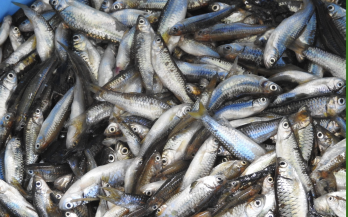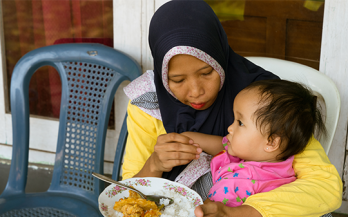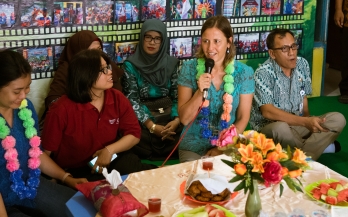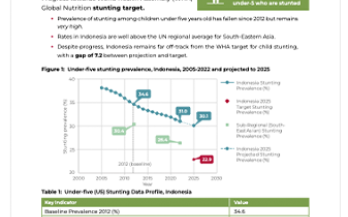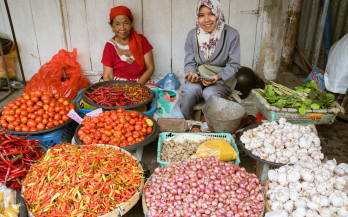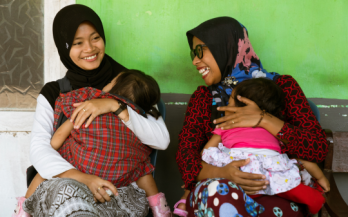- 13/02/2026
Tempeh is a popular traditional plant-based protein that plays a vital role in Indonesian diets. Indonesia’s reliance on imported soybeans (2.6 million tons/year) for tempeh production, however, creates market instability and food vulnerabilities, particularly regarding cost and supply fluctuations. This paper analyses the technical, economic, and market feasibility of alternative legumes—specifically, jack beans, mung beans, and peanuts—as sustainable substitutes for soybeans in tempeh production. The aim is to identify the most viable option for immediate scale-up to support local food systems and improve nutritional outcomes.
- 06/02/2026
Fish offer a potentially sustainable solution to food security and nutrition challenges in Indonesia. Despite abundant aquatic resources, per capita fish consumption remains lower than in neighbouring countries. Factors such as overfishing, pollution, and unsustainable aquaculture practices limit growth, while climate change poses additional threats to fish stocks.
- 02/10/2025
Food culture refers to a shared value system, norms, symbols, and perceptions. Yet within the food and nutrition sector, it is often reduced to traditional foods, dishes, or cuisines—a narrow view that constrains how food culture could be leveraged to shape future food preferences and habits. This working paper reviews Indonesian food culture broadly, seeking to understand and appreciate the country’s diverse cuisine. The paper draws on data from governmental reports, academic papers, media reports, social media analysis, and expert interviews.
- 16/06/2025
Indonesia’s 2025 update of its Food Security and Vulnerability Atlas (FSVA) marks a transformative leap in the nation’s
commitment to building a resilient, data-driven food system. While the FSVA has been updated annually in previous years, the 2025 edition introduces major innovations, including the use of village-level data for over 83,000 villages, expanded sub-district analysis, and the integration of new composite indicators and predictive modeling. These advances enable the more precise identification of food-insecure areas, supporting targeted actions aligned with national priorities, such as reducing stunting, alleviating poverty, and promoting rural development. With these enhancements, FSVA 2025 strengthens Indonesia’s capacity to deliver evidence-based, locally tailored
interventions across all levels of government.
- 09/06/2025
The Nutrition for Growth (N4G) Summit 2025 is set to be a defining global event, providing a vital platform for countries to reaffirm and strengthen their commitments toward ending all forms of malnutrition. This summit holds global significance as it seeks to accelerate progress toward the Sustainable Development Goals (SDGs), particularly goals related to nutrition, health, and sustainable food systems. For Indonesia, the 2025 Summit represents an opportunity to build upon and deepen its commitments from previous summits, specifically targeting persistent challenges such as stunting, wasting, obesity, and anemia, while reinforcing systemic integration of nutrition within broader health and social protection frameworks.
- 03/06/2025
The world is facing multiple interconnected crises, including climate change and escalating conflicts, which pose significant challenges to food systems. These issues highlight the need for systemic transformation to improve food security, nutrition, and environmental sustainability. In response, GAIN's Nourishing Food Pathways (NFP) programme aims to strengthen and support the implementation of food system pathways in 11 countries.
- 16/05/2025
WHA Global Nutrition Stunting Target 2012-2025
Achieve a 40% reduction in the number of children under-5 who are stunted
WHA Global Nutrition Overweight Target 2012-2025
Ensure that there is no increase in childhood overweight
- 28/10/2024
Indonesia is confronting a pressing public health challenge that extends beyond diet: the impact of non- communicable diseases (NCDs) driven by lifestyle factors, including high sodium intake. This issue
is particularly concerning as many NCDs, such
as hypertension and cardiovascular disease, are preventable yet contribute significantly to the country’s morbidity and mortality rates. For instance, Indonesia’s stroke burden remains substantial, with a Disability- Adjusted Life Years (DALYs) rate of 3,809 per 100,000 people in 2021,1 one of the highest in Southeast Asia, reflecting the urgent need for targeted public health interventions.
- 27/08/2024
This brief explains some key findings and recommendations from a recent roadmap report on FLW reduction produced by the Ministry of National Development Planning (BAPPENAS), with key partnerships from the Global Alliance for Improved Nutrition (GAIN). It highlights the crucial role of coordinated efforts in achieving the desired reduction in FLW and thereby mitigating its environmental and economic impacts.
- 31/05/2024
Micronutrient malnutrition remains a significant challenge in Indonesia, particularly among impoverished populations who struggle to afford and access nutrient-rich foods. Iron deficiency anemia is especially concerning, affecting 48.9% of pregnant women and 38.5% of children across the country. To address these gaps, the Ministry of Health, in collaboration with the Global Alliance for Improved Nutrition (GAIN), conducted a comprehensive Micronutrient Gap Assessment (MGA). This assessment aimed to evaluate micronutrient intake levels among Indonesians and identify the potential benefits of rice fortification in meeting recommended dietary requirements.

